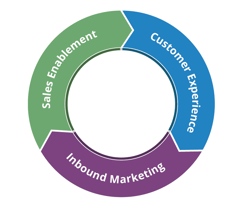Disclaimer: Although this post was written by an attorney and contains legal information, it does not constitute legal advice. Reading this post does not create an attorney-client relationship between the author and any reader. If you need legal advice, hire an attorney.
We’ve all heard that “content is king,” and companies are pressured to create quality content on short notice. To be efficient, many content creators may be committing legal missteps in their work, which can be costly in terms of legal fees, reputational damage, time, and stress. When developing your content strategy, these missteps can be avoided if you know what to look for and what to remember.
I have been researching and writing about the legalities of blogging since 2010. These are my top five tips for avoiding some of the most common legal pitfalls related to content creation:
1. Create Your Own Content
If you like someone else’s content, post a link to it or quote a portion of it and discuss what you like about it. Do not simply copy and paste the material to your site and claim it as your own. That could put you at high risk of being accused of copyright infringement.
You might think that this is an obvious lesson that doesn’t bear repeating, and that’s what I thought until I had a blog post copied word-for-word without my permission earlier this year. In both cases, the bloggers thought they could copy my content as long as they gave attribution and a link to the original. What they did was admit they were using my material, and the link alerted me to the possible infringement when it showed up in my analytics.
2. Be Careful Where You Get Images
The most common and costly mistake I see bloggers make is using images without permission. Many people believe they can use any image they find using a Google Image search. This is an easy way to commit copyright infringement, which in the worst-case scenario could result in you being sued for $150,000 per image, plus attorneys’ fees.
I recommend using Creative Commons. These are images where the artists put licenses on their work that tells you how you may use it. I recommend using images that come with a license to modify the original (so you can crop it if desired) and commercialize it (so you can use it for business purposes). If there is an image that you want to use that doesn’t come with a Creative Commons license, you can always contact the copyright owner and request permission to use it.
3. Avoid Making Defamatory Statements
The law cares about what you said, not what you meant. If you are an outspoken writer or have a tendency to rant, be careful that your statements don’t cross the line into defamation. Defamation requires a statement about a person that’s communicated to a third party that hurts that person’s reputation.
It’s important to also do thorough research to ensure your statements are accurate because repeating someone else’s false statements may be accused of defamation even if you didn’t know you were telling a lie when you wrote the post.
4. Make Sure You Own All Content Created for Your Business
Many people assume that they own the copyright when they hire a third-party contractor or crowdsourcing blog content site to create content for you. If you want to repurpose the content from one of these third-party sites, or if you want to own the copyright, you have to work with them directly on this.
5. If You Outsource Content, Make Sure You’re Indemnified
Examine your contract to ensure that your contractors attest that they have created original content for you and/or obtained proper permission to use others’ content. Without such a provision, you may be held responsible for a content misstep.
These are all mistakes that are easy to make and easy to avoid with proper education, planning, and contracts. If you have questions regarding your content creation, please contact a social media attorney in your community. This area of law is constantly evolving as new technologies and practices are being developed, so it is important to stay abreast of the latest information about how the law applies to standard social media practices.
 Ruth Carter is a licensed attorney in Arizona and the author of the best-seller The Legal Side of Blogging: How Not to get Sued, Fired, Arrested, or Killed. As the owner of Carter Law Firm in Phoenix, her practice focuses on social media law, intellectual property, business contracts, and flash mob law.
Ruth Carter is a licensed attorney in Arizona and the author of the best-seller The Legal Side of Blogging: How Not to get Sued, Fired, Arrested, or Killed. As the owner of Carter Law Firm in Phoenix, her practice focuses on social media law, intellectual property, business contracts, and flash mob law.

.png?width=80&height=80&name=diamond-badge-color%20(1).png)
__Square.png?width=250&height=250&name=Marketing_Hub_(1)__Square.png)




.png?width=250&name=diamond-badge-color%20(1).png)
